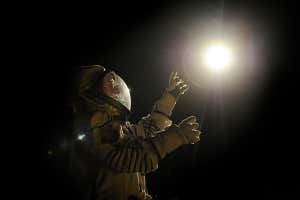
 science
science 
[ad_1]
The sun is in rapid decline in Project Hail Mary – can a strange duo fix it?
Andy Buchanan / Alamy
I have been a fan of apocalyptic sci-fi since I was hooked as a teenager by the 1950s classic The Day of the Triffids, by UK author John Wyndham. Rather than putting me off, the covid-19 pandemic has actually fed my appetite for end-of-the-world tale. That is because the past year has shown us in real life, though on a lesser scale, how we face global threats and whether authorities will ride roughshod over civil liberties to save lives overall.
But from deadly plagues to nuclear armageddon and oncoming asteroids, I thought I had heard all the different ways civilisation could be doomed, but Andy Weir, author of The Martian, has come up with a new variant.
An anomaly is discovered in the sun’s radiation. Our star’s output has started to dim and the rate of decline is exponential. Within 20 years there will be ice ages, crop failures and mass starvation.
The explanation for what is happening to the sun and how to solve it is almost too far-fetched, yet Weir makes the science just about credible.
Astrobiologist Ryland Grace, uniquely qualified for the space mission to save the sun, wakes up millions of miles from Earth with dead crewmates and little to no memory of what he is doing there or how to do it.
And that isn’t even the most interesting aspect of this tale. Spoiler alert: there’s a plot twist early in the tale, so look away now if knowing it would annoy you.
Grace encounters an alien lifeform. What’s more, in order to save our star and therefore Earth, he needs to be able to talk to this alien, which he names Rocky because of its appearance.
The “first contact” moment when humans meet an alien species has, like world ending events, long been fertile ground for sci-fi. How the two would communicate if they don’t share anatomy or biochemistry is not only an interesting philosophical problem, but is being studied for real, just in case.
Some sci-fi stories solve the communication problem by gifting the aliens such superior intelligence that they learn English from terrestrial broadcasts that leak into space, arriving ready to talk turkey. But in Project Hail Mary, Grace has no such luck; Rocky turns out to be from a species of roughly similar intelligence and technological ability as humans.
Cut off from their home worlds, Grace and Rocky have to use their ingenuity to learn how to communicate, in laborious trial-and-error fashion, at the same time as working out how to save the sun from impending doom. Their relationship lends this book much of its charm.
For me, there is perhaps a little too much Martian-style detail about how Grace solves the many engineering problems on his mission, but that didn’t stop me enjoying the tale.
Director Ridley Scott turned The Martian into a wonderfully feel-good movie, where Matt Damon as the marooned astronaut has the immortal line: “I’m going to have to science the shit out of this.” It could equally apply to the attitudes of Grace and Rocky in Project Hail Mary. And, who knows, perhaps a few coronavirus vaccine developers took inspiration from it, too.
Project Hail Mary by Andy Weir is out now
More on these topics:
[ad_2]